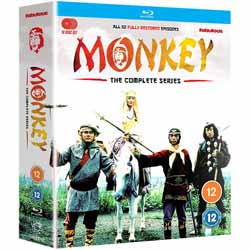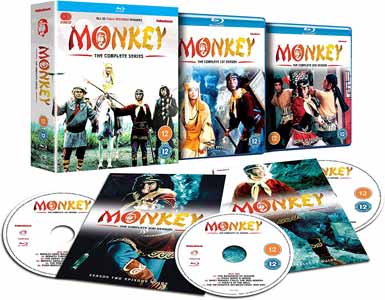|
Click here to return to the main site. Blu-ray Review
There are certain pivotal moments in history where it is common to be asked that you cast your mind back to where you were at that moment; the day that Kennedy was shot, the day that Diana died and the day that the BBC first premiered Monkey. Ok, I may have exaggerated the last one.... I clearly remember that moment. I was sat, cross legged, in front of the telly, eager to catch the show which the BBC had released two teaser introductions, and by a minor miracle had caught my youthful interest. It was 1979. There were still only three channels on the television and four people in the house. As the youngest, I was bottom of the pecking order when it came to gaining control of the box in the living room which emitted such entertainment treasures. The title sequence unfolded onto the screen with an intriguing exposition of what was to follow and then it kicked into gear with the funkiest theme music about an ancient Chinese legend I have heard then or since. If you are short of reading time I suggest that you go watch that introduction. Now! Go on! It will render the rest of this review superfluous. If you are not hooked by that introduction then Monkey is not for you. Still here? Good. There I was settled, happy and ready to go. It was at this point that my Mother entered and announced that we were all off to watch the Christmas lights being turned on In All Saints Square in Rotherham Town centre. My disappointment was immense. You remember community events, don’t you? A large crowd gathered around the fountains in the square, source of the ever amusing “Let’s see was happened if we throw a full bottle of washing up liquid in while we are drunk” gag, red telephone boxes upon which the more daring youths sat to watch the events and a Police telephone box. The latter was a disappointing thin affair, containing just the telephone set the Rozzers used to use to ring in crimes before police radio sets was common. It took an elastic stretch of my youthful imagination to think of the portly Tom Baker squeezing through the door to access the vast realms of this particular TARDIS than I took to believe in the bigger on the inside TARDIS. I digress. To placate the understandably grumpy kitten that I had become (heaven forbid a Mother should try to drag her offspring outside to share time with his family instead of burning his retina in front of the telly...) she offered the immortal words “Don’t worry, it’ll be repeated and you can watch them all then”. And here we are, over forty years later, with the complete series on Blu-ray in my sweaty mitts. Monkey is a Japanese TV series based on the 16th century Chinese novel, Journey to the West, by Wu Cheng'en. It is shot as an action/comedy series with a little Eastern Philosophy thrown in for good measure. I dislike the expression “cult classic”. I often find that this is applied to series that are lazily written and badly executed to avoid stating that this so-called classic is just bad. I hope, in these few brief words, to demonstrate why I think that Monkey earns the title classic and not the other epithet of bad. It concerns a young monk, Tripitaka, who is informed by the Buddha to travel to India to retrieve a series of Holy Scriptures to bring enlightenment to Earth and save souls from the torment of Hell. I am using the series' own fairly simplified version of many centuries of intricate Eastern thought, so I apologise if some of the words/concepts used are jarring to more knowledgeable ears. On the way he gathers three companions in the form of animal monsters/former angels: Monkey (a stone monkey), Pigsy (a pig monster) and Sandy (water monster). With the introduction of animal spirits, demons and gods, Monkey is also an example of the Shenmo genre, where mystical beings and talking animals represent the fantasy elements. If the idea of a plot where animals struggle to complete a quest seems a little much then please consider such cannons in the West as Peter Rabbit, Watership Down and a large portion of the output of the Disney Corporation. Monkey is the standard quest plot. A group of individuals have a series of adventures from point A to point B to gain object X. Typically, early in a quest one or more of the heroes balks at the idea of leaving their cosy life and venturing out into the wilds. We have Monkey rejecting the Quest and being forced to comply via a gold band around his head, controlled by Tripitaka chanting a sutra that tightens the band and causes him pain. The joy in the journey is the getting there and not the arriving. What would The Lord of the Rings have been if the eagles just dropped the hobbits off at Mount Doom? This was a fact Tolkien was well aware of. His reply were words to the effect of, “They’re not a bloody taxi service!” The four, (becoming five in series two, when the Dragon, Yu Lung transformed into a horse in series one, is struck by lightning and becomes able to assume the form of a man) gets way laid by demons, animal spirits and warriors of the Chinese empire and shoot off on side quests. This is normally because Pigsy is led astray by the promise of wine, women and food. Generally it’s all three. This is monster of the week country and none the worse for it. Our trio of heroes are the archetypes of the traditional three part band who, on their own, possess a valuable trait but become stronger when they can combine and act together. This is the main plotting device of Monkey. In this kind of story each one of the heroes has a certain trait; a portion of courage (I was going to say “balls” to keep to the biological theme but decided against it), heart and brains. This is a recurring character setup. Star Trek has Kirk (courage), Bones (heart) and Spock (brains). Kirk possesses the courage to take action but his actions are tempered and corrected by the scientific advice of Spock and the emotional input of Bones. In The Wizard of Oz too (especially the book) the trio are, literally, questing to discover the traits they already possess; Lion (courage), Tinman (heart) and Scarecrow (brains) to assist Dorothy. Monkey is proud and brash but undoubted brave. Pigsy is greedy and crude but possesses a soft heart. While Sandy is no rocket scientist, he does seem the one to take the more measured approach and consider other alternatives before wading in with a big stick. When they separate or abandon the quest they are undoubtedly diminished without the others and quickly return to the fold. They become friends in adversity. Monkey is unashamedly fun! A certain former Cha-cha-cha champion from Hong Kong has already entered the universal consciousness. Bruce Lee WAS Kung Fu. The BBC was just tapping a rich vein whose time was ripe. They wanted a series to ride the wave of Kung Fu madness and here was Monkey. It entered the martial art zeitgeist and added to it. My friends and I happily set to beating one another with broom handles in remembrance of Monkey’s exploits, whistling up clouds to ride upon and generally being little Bruce Lees. Finally, the entirety of both Monkey series are complete and in one place. For this I am eternity grateful. Are there any issues? Well, unfortunately, yes. The series was dubbed in an exaggerated “oriental” accent. I’m not going to touch that with a ten foot wishing pole. I’m neither qualified nor familiar enough with Asian issues to make any serious comment. I will add that the translation and dubbing appears to be a work of love with comedy effect in mind without appearing to be mockery. The dialogue is full of Tony Hancock-esque juxtaposition of the slight haughty tone tempered with down to earth colloquialisms (i.e. on seeing the Buddha in his female aspect Monkey exclaims, “I thought you were a fellah!”). The special effects are extremely hokey. Even considering the low budget constraints, the effects are cheap. Paper Mache dragons, very familiar superimposed cloud effects that end with a hard edge and toys running along a track through an obvious model set. However I consider all this adds to the naive charm of the series. Finally, this is not an enhanced version of the original series. There is no cleanup work here. The film stock is grainy, there are hairs caught in the gate which flick around the screen, dirt caught in the emulsion and lots of the outside shots have light burn on the edges of the film. However, none of these matter and in many ways add to the enjoyment of the series. Monkey is meant to be humorous, uncomplicated and fun. The characters are engaging and the actors (also pop singers in the case of Monkey and Sandy) put in an excellent job considering the material and budgets. You like them. You care for them . You want them to win. I’m massively aware that this type of thing will not appeal to many a viewer but for me this is an excellent choice to complete a forty year old quest of my own and watch the “repeats” of Monkey. 9 (if the print had been enhanced it would have been a 10!) In Memoriam: I was saddened to learn of the passing away of Shiro Kishibe, the actor who played Sandy, on 28th August 2020 from heart failure at the age of 71. As well as being an actor he was also guitarist and vocalist for the band The Tigers. Let’s hope that Sandy has reclaimed his deserved rewards as the Western Heavens claim him back. Dean Smales
Buy this item online
|
|---|


